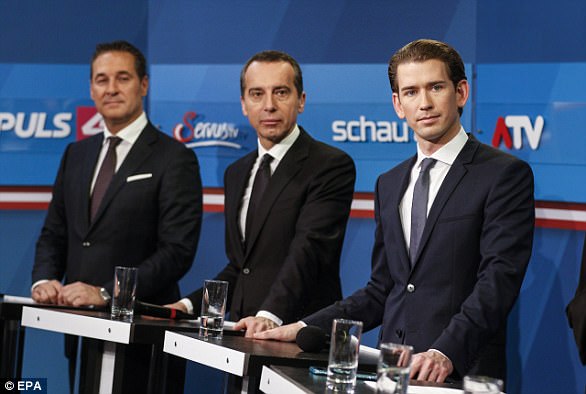Novi kancelar? Sebastian Kurz, dečko kojem se žuri postati najmlađi europski vođa
Page 3 of 3
Page 3 of 3 •  1, 2, 3
1, 2, 3
 Re: Novi kancelar? Sebastian Kurz, dečko kojem se žuri postati najmlađi europski vođa
Re: Novi kancelar? Sebastian Kurz, dečko kojem se žuri postati najmlađi europski vođa
27% Strahe
Sad ću se makni do idućeg isilov napad u Evropi
Bit će ovo i 45%
Sve ću muđahedine tamo
POBIT
Sad ću se makni do idućeg isilov napad u Evropi
Bit će ovo i 45%
Sve ću muđahedine tamo
POBIT
RayMabus- Posts : 184105
2014-04-11
 Re: Novi kancelar? Sebastian Kurz, dečko kojem se žuri postati najmlađi europski vođa
Re: Novi kancelar? Sebastian Kurz, dečko kojem se žuri postati najmlađi europski vođa
AUSTRIJSKI IZBORI: Glasovi poštom riješit će tijesnu utrku socijaldemokrata i slobodnjaka
Objavljeno: 16.10.2017. u 08:17h

Piše: PolitikaPlus/Hina
Glasovi pristigli poštom na austrijskim parlamentarnim izborima biti će prebrojani u ponedjeljak i oni će riješiti pitanje tijesne utrke socijaldemokrata (SPO) i desničarskih slobodnjaka (Slobodarske stranke, FPO) za drugo mjesto na izborima i u određenoj mjeri utjecati na pregovaračke pozicije uoči koalicijskih pregovora o formiranju nove austrijske vlade.
Konzervativna Narodnjačka stranka (OVP), čelnika Sebastiana Kurza, koji je svojom 31 godinom na dobrom putu da postane jedan od najmlađih premijera u svijetu, osigurala je najveći broj glasova i pobjedu na nedjeljnim izborima, no morat će ući u koaliciju kako bi oformila vladu. Vjerojatnije je da će to postići sa Slobodarskom strankom (FPO), iako je Kurz oprezan i želi držati sve opcije otvorenima.
"Ni koalicija sa FPO, a niti ona sa SPO nije dogovorena", kazao je Kurz za televiziju ORF upitan za svoje planove. "Moramo čekati rezultate", rekao je.
Većina glasova pristiglih poštom, koji čine otprilike šestinu glasačkih listića, bit će prebrojana do ponedjeljka navečer, no konačan rezultat vjerojatno neće biti objavljen prije četvrtka.
Projekcije koje objavljuje SORA pokazuju da narodnjaci (OVP) osvajaju relativno najveći broj glasova - 31,6 posto, na temelju svih prebrojanih glasova ne računajući one pristigle poštom. Njihovi dosadašnji koalicijski partneri, socijaldemokrati kancelara Christiana Kerna osvajaju 26,9 posto, malo više od slobodnjaka iz FPO-a, koji osvajaju 26 posto.
Projekcije imaju marginu pogreške od 0,7 posto, što znači da je utrka za drugo mjesto na izborima više nego li tijesna.
Druge projekcije, koje objavljuje agencija ARGE Wahlen, daju socijaldemokratima samo 0,5 posto više glasova od FPO-a.
Rekordan broj zahtjeva za glasanje poštom, njih više od 889.000, upućen je uoči nedjeljnih izbora.
U Austriji ove glasove može prebrojati pošta ili se mogu prebrojati na biračkim mjestima. Također mogu biti prebrojani i na drugim mjestima, ne samo na onome na kojem je birač registriran. U tom slučaju taj glas mora biti poslan u biračev izborni okrug, što je i razlog zbog kojeg bi konačan rezultat mogao biti dostupan tek u četvrtak.
Ovaj sustav je nov i otežava predviđanja, no ipak se očekuje da će većina glasova pristiglih poštom biti prebrojana u ponedjeljak i da će to omogućiti saznanje koja stranka je osvojila drugo mjesto na izborima.
Sve su varijante suradnje triju najjačih stranaka nakon izbora načelno moguće s obzirom da su socijaldemokrati ukinuli zabranu, koju su sami postavili, koaliranja sa FPO. No, budu li na trećem mjestu, malo je vjerojatno da bi ušli u koaliciju s desničarskim FPO-om i prihvatili njihova čelnika Heinz-Christiana Strachea kao kancelara.
http://politikaplus.com/novost/163042/glasovi-postom-rijesit-ce-tijesnu-utrku-socijaldemokrata-i-slobodnjaka
Ovaj sustav je nov i otežava predviđanja, no ipak se očekuje da će većina glasova pristiglih poštom biti prebrojana u ponedjeljak i da će to omogućiti saznanje koja stranka je osvojila drugo mjesto na izborima.
Objavljeno: 16.10.2017. u 08:17h

Piše: PolitikaPlus/Hina
Glasovi pristigli poštom na austrijskim parlamentarnim izborima biti će prebrojani u ponedjeljak i oni će riješiti pitanje tijesne utrke socijaldemokrata (SPO) i desničarskih slobodnjaka (Slobodarske stranke, FPO) za drugo mjesto na izborima i u određenoj mjeri utjecati na pregovaračke pozicije uoči koalicijskih pregovora o formiranju nove austrijske vlade.
Konzervativna Narodnjačka stranka (OVP), čelnika Sebastiana Kurza, koji je svojom 31 godinom na dobrom putu da postane jedan od najmlađih premijera u svijetu, osigurala je najveći broj glasova i pobjedu na nedjeljnim izborima, no morat će ući u koaliciju kako bi oformila vladu. Vjerojatnije je da će to postići sa Slobodarskom strankom (FPO), iako je Kurz oprezan i želi držati sve opcije otvorenima.
"Ni koalicija sa FPO, a niti ona sa SPO nije dogovorena", kazao je Kurz za televiziju ORF upitan za svoje planove. "Moramo čekati rezultate", rekao je.
Većina glasova pristiglih poštom, koji čine otprilike šestinu glasačkih listića, bit će prebrojana do ponedjeljka navečer, no konačan rezultat vjerojatno neće biti objavljen prije četvrtka.
Projekcije koje objavljuje SORA pokazuju da narodnjaci (OVP) osvajaju relativno najveći broj glasova - 31,6 posto, na temelju svih prebrojanih glasova ne računajući one pristigle poštom. Njihovi dosadašnji koalicijski partneri, socijaldemokrati kancelara Christiana Kerna osvajaju 26,9 posto, malo više od slobodnjaka iz FPO-a, koji osvajaju 26 posto.
Projekcije imaju marginu pogreške od 0,7 posto, što znači da je utrka za drugo mjesto na izborima više nego li tijesna.
Druge projekcije, koje objavljuje agencija ARGE Wahlen, daju socijaldemokratima samo 0,5 posto više glasova od FPO-a.
Rekordan broj zahtjeva za glasanje poštom, njih više od 889.000, upućen je uoči nedjeljnih izbora.
U Austriji ove glasove može prebrojati pošta ili se mogu prebrojati na biračkim mjestima. Također mogu biti prebrojani i na drugim mjestima, ne samo na onome na kojem je birač registriran. U tom slučaju taj glas mora biti poslan u biračev izborni okrug, što je i razlog zbog kojeg bi konačan rezultat mogao biti dostupan tek u četvrtak.
Ovaj sustav je nov i otežava predviđanja, no ipak se očekuje da će većina glasova pristiglih poštom biti prebrojana u ponedjeljak i da će to omogućiti saznanje koja stranka je osvojila drugo mjesto na izborima.
Sve su varijante suradnje triju najjačih stranaka nakon izbora načelno moguće s obzirom da su socijaldemokrati ukinuli zabranu, koju su sami postavili, koaliranja sa FPO. No, budu li na trećem mjestu, malo je vjerojatno da bi ušli u koaliciju s desničarskim FPO-om i prihvatili njihova čelnika Heinz-Christiana Strachea kao kancelara.
http://politikaplus.com/novost/163042/glasovi-postom-rijesit-ce-tijesnu-utrku-socijaldemokrata-i-slobodnjaka

Guest- Guest
 Re: Novi kancelar? Sebastian Kurz, dečko kojem se žuri postati najmlađi europski vođa
Re: Novi kancelar? Sebastian Kurz, dečko kojem se žuri postati najmlađi europski vođa
u sarajevu vec kukaju..izbor kurca promjena politike austrije prema bh-a

vuksadinare- Posts : 100240
2015-09-08
 Re: Novi kancelar? Sebastian Kurz, dečko kojem se žuri postati najmlađi europski vođa
Re: Novi kancelar? Sebastian Kurz, dečko kojem se žuri postati najmlađi europski vođa
Victory for Austria's new anti-EU leader and surge in support for anti-immigrant party sends shockwaves through Europe as Merkel warns of 'big challenge' ahead
By Joe Sheppard and Gareth Davies and Scott Campbell For Mailonline
Published: 13:44 BST, 16 October 2017 | Updated: 14:11 BST, 16 October 2017
Sebastian Kurz's election victory last night has sent shockwaves through Europe as it appears he may seek a coalition with the country's anti-immigration Freedom Party.
The Eurosceptic leader of Austria's right-leaning People's Party has declared victory in a national election that puts him on track to become the world's youngest leader.
Kurz, 31, fell well short of a majority and may be looking to strike a deal with another party.
The Freedom Party (FPO) got around 26 percent of votes in Sunday's parliamentary vote, boosted by a European migration crisis in 2015 that affected Austria and also led Kurz to campaign on an anti-migration platform.
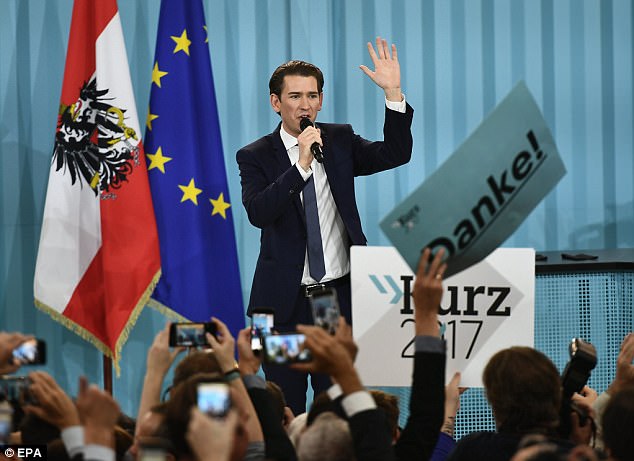
Austrian foreign minister Sebastian Kurz, 31, claimed the win on Sunday night after projections gave his party a comfortable lead with more than 90 percent of the ballots counted
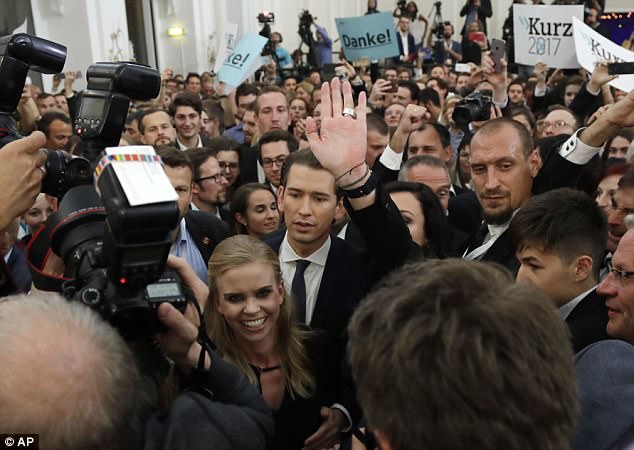
Foreign Minister Sebastian Kurz, head of Austrian People's Party, arrives to the election party in Vienna, Austria, Sunday, October 15, 2017, after the closing of the polling stations for the Austrian national elections
Today European Union ministers congratulated Austria's Sebastian Kurz on his election victory but some were uneasy about the far-right, eurosceptic party that may enter the new government.
And German chancellor Angela Merkel warned that the surge in support for the FPO posed a 'big challenge' for other parties.
Before arriving to talks with his EU peers Luxembourg Foreign Minister Jean Asselborn said: 'I don't have a problem with Sebastian Kurz as a person. We're not following the same line politically, that has never been the case and it never will be.'
He listed pro-European Austrian politicians as role models for Kurz and warned Vienna not to side with migration hardliners, including Hungary, whose government is also eurosceptic.
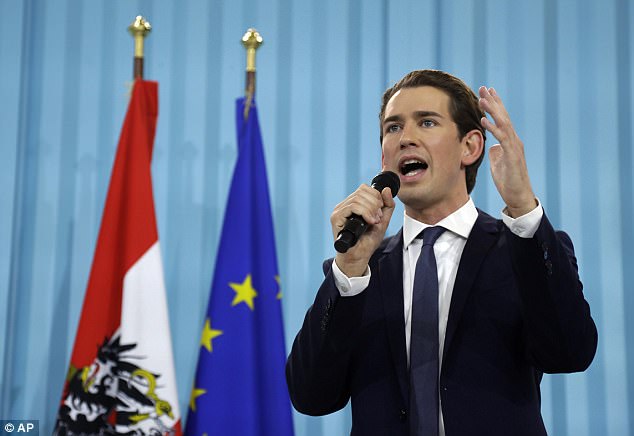
Foreign Minister Sebastian Kurz, head of Austrian People's Party, speaks during the election party in Vienna
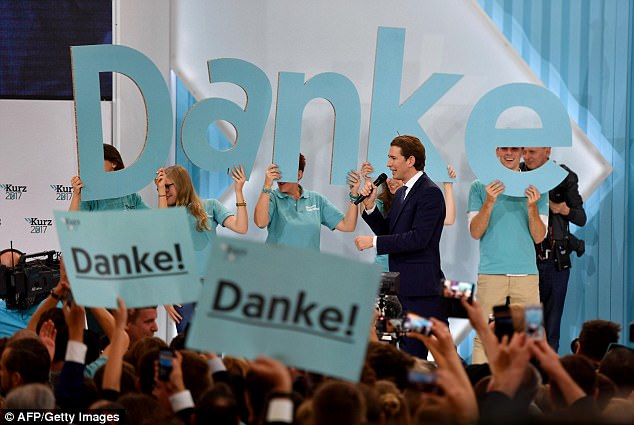
Sebastian Kurz speaks to supporters, who are holding up signs reading 'Danke', which translates to thank you, during the party's election event
Austria became a member of the European Union in 1995 after voting in favour of joining the bloc with a two-thirds majority. Recent opinion polls suggest three quarters of Austrians want the country to stay in the bloc.
The FPO demanded a referendum only last year to exit the EU, as Britain is doing now. The party has toned down its anti-EU rhetoric in recent months but continues to call for weaker members to leave the euro zone and Austria to pay less into the common EU budget.
Hungarian Foreign Minister Peter Szijjarto, entering the same talks in Luxembourg, said the 31-year-old Austrian conservative was his friend.
'We are happy that a sister party of ours won the elections ... and we are happy that their candidate has won who in many cases represented similar positions regarding migration to the Hungarian government,' Szijjarto told reporters.
He added he expected that the anti-immigration eastern EU states - Hungary, Poland, Slovakia and the Czech Republic - to work more closely with Austria now, which would only deepen the east-west divides weakening the bloc's unity.
As Austria turns to the right, the bloc's top official dealing with EU's ties with its neighbours, Commissioner Johannes Hahn of Austria, sought to ease concerns that Vienna may cause problems for the bloc.
'One should not forget that only a year ago Austria elected the first Green president and now it looks as if the Greens will be kicked out of parliament. There is a huge volatility among voters,' Hahn said in Luxembourg. 'Each government will have a very pro-European agenda because all the major political parties are very much committed to the European Union,' he added.
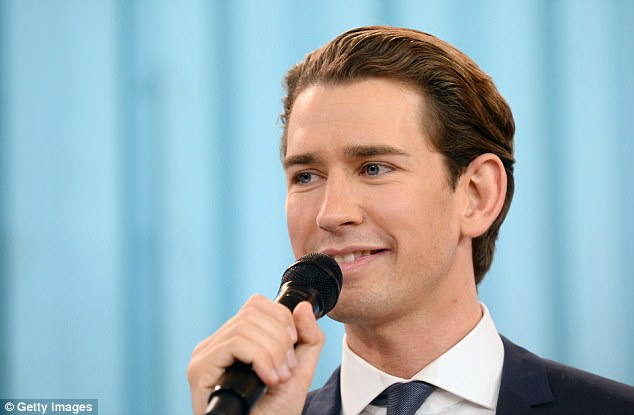
The fresh-faced Sebastian Kurz addresses his supporters after declaring victory in the elections
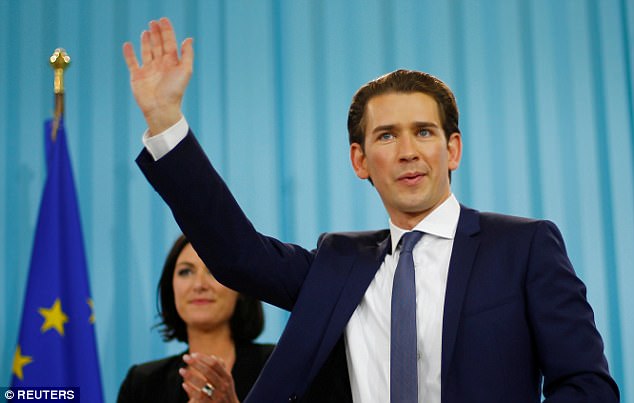
The leader of Austria's right-leaning People's Party, pictured waving, has declared victory in a national election that puts him on track to become the world's youngest leader
Kurz has not ruled out the possibility of forming a minority government once the final result comes in.
The young leader, dubbed Wunderwuzzi in his home country, which translates to Wonderkid, has pledged to cut benefits for all foreigners in Austria and has vowed to stop the European Union meddling in the country's politics.
Kurz, also dubbed the Conservative Macron due to his age and his party reform, said: 'I would of course like to form a stable government. If that cannot be done then there are other options,' adding that he planned to talk to all parties in parliament but would first wait for a count of postal ballots that began today.
That count will settle the close race for second place between the Social Democrats and the far-right Freedom Party.
The projections had the People's Party getting 31.7 per cent of the vote, a gain of more than seven percentage points from the 2013 election.
Final results will not be available until mid-week after absentee ballots and ballots cast by voters away from their home districts are counted.
The projections showed the centre-left Social Democrats receiving 26.9 percent and the vote and the anti-migrant, eurosceptic Freedom Party 26 percent.
In his victory speech, he said: 'I can only say, I am really overwhelmed. We campaigned for several months.
'We built a massive movement. We had a goal to be the first ones over the (finish) line on October 15.
'We have made the impossible possible. Thank you for all your work and for this historic success.'
'Today is not about triumphing over others. But today is the day for real change in our country. Today has given us a strong mandate to change this country, and I thank you for that.'
'We were handed a great responsibility from the voters, and we should all be aware of it. We should also be aware that a lot of people have put their hopes into our movement.
'I can promise you that I will fight with all my strength and all my commitment for change in this country, and I want to invite you all to come along this path together with me.'
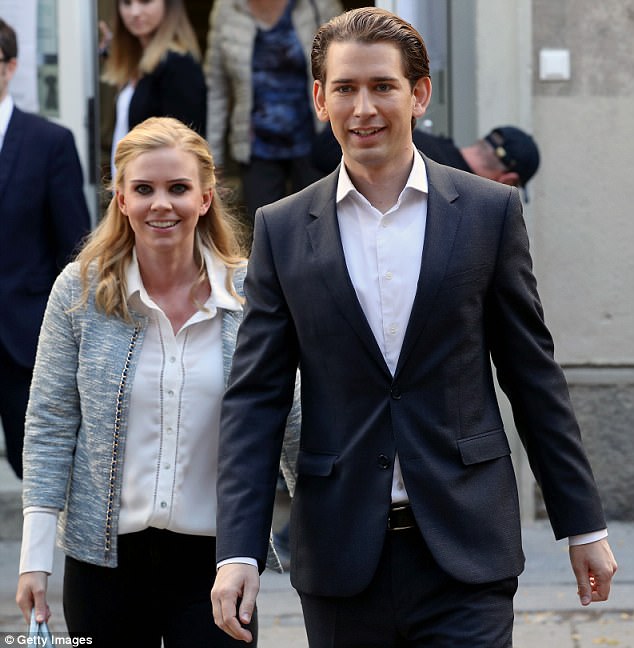
Conservative Sebastian Kurz, 31, is set to take power and form an alliance with the far-right. He is pictured today with his girlfriend Susanne Thier
As well as his pledge on payouts to migrants, Kurz wants to slash Austria's red tape and keep the EU out of national affairs.
At 31, Kurz is young even by the standards of Europe's recent youth movement, which saw Macron enter the Elysee Palace at the age of 39 and Christian Lindner, 38, lead Germany's liberal Free Democrats (FDP) back into the Bundestag.
Kurz and Lindner showed that young new faces can inject dynamism into old establishment parties that have lost their way with voters.
Kurz rebranded the OVP as the New People's Party and changed its colours from black to turquoise.
Lindner used trendy black-and-white campaign posters that showed him staring at his smartphone to revitalise the FDP's image.
Macron, who formed his own political movement, was able to paint himself as a rebel outsider despite having served for four years under failed French Socialist Francois Hollande.
- Conservative Sebastian Kurz, 31, is set to take power and form far-right alliance
- His People's Party is forecast to reap more than 30 percent of the election vote
- In a move that will alarm Brussels he wants to keep the EU out of national affairs
By Joe Sheppard and Gareth Davies and Scott Campbell For Mailonline
Published: 13:44 BST, 16 October 2017 | Updated: 14:11 BST, 16 October 2017
Sebastian Kurz's election victory last night has sent shockwaves through Europe as it appears he may seek a coalition with the country's anti-immigration Freedom Party.
The Eurosceptic leader of Austria's right-leaning People's Party has declared victory in a national election that puts him on track to become the world's youngest leader.
Kurz, 31, fell well short of a majority and may be looking to strike a deal with another party.
The Freedom Party (FPO) got around 26 percent of votes in Sunday's parliamentary vote, boosted by a European migration crisis in 2015 that affected Austria and also led Kurz to campaign on an anti-migration platform.

Austrian foreign minister Sebastian Kurz, 31, claimed the win on Sunday night after projections gave his party a comfortable lead with more than 90 percent of the ballots counted

Foreign Minister Sebastian Kurz, head of Austrian People's Party, arrives to the election party in Vienna, Austria, Sunday, October 15, 2017, after the closing of the polling stations for the Austrian national elections
Today European Union ministers congratulated Austria's Sebastian Kurz on his election victory but some were uneasy about the far-right, eurosceptic party that may enter the new government.
And German chancellor Angela Merkel warned that the surge in support for the FPO posed a 'big challenge' for other parties.
Before arriving to talks with his EU peers Luxembourg Foreign Minister Jean Asselborn said: 'I don't have a problem with Sebastian Kurz as a person. We're not following the same line politically, that has never been the case and it never will be.'
He listed pro-European Austrian politicians as role models for Kurz and warned Vienna not to side with migration hardliners, including Hungary, whose government is also eurosceptic.

Foreign Minister Sebastian Kurz, head of Austrian People's Party, speaks during the election party in Vienna

Sebastian Kurz speaks to supporters, who are holding up signs reading 'Danke', which translates to thank you, during the party's election event
Austria became a member of the European Union in 1995 after voting in favour of joining the bloc with a two-thirds majority. Recent opinion polls suggest three quarters of Austrians want the country to stay in the bloc.
The FPO demanded a referendum only last year to exit the EU, as Britain is doing now. The party has toned down its anti-EU rhetoric in recent months but continues to call for weaker members to leave the euro zone and Austria to pay less into the common EU budget.
Hungarian Foreign Minister Peter Szijjarto, entering the same talks in Luxembourg, said the 31-year-old Austrian conservative was his friend.
'We are happy that a sister party of ours won the elections ... and we are happy that their candidate has won who in many cases represented similar positions regarding migration to the Hungarian government,' Szijjarto told reporters.
He added he expected that the anti-immigration eastern EU states - Hungary, Poland, Slovakia and the Czech Republic - to work more closely with Austria now, which would only deepen the east-west divides weakening the bloc's unity.
As Austria turns to the right, the bloc's top official dealing with EU's ties with its neighbours, Commissioner Johannes Hahn of Austria, sought to ease concerns that Vienna may cause problems for the bloc.
'One should not forget that only a year ago Austria elected the first Green president and now it looks as if the Greens will be kicked out of parliament. There is a huge volatility among voters,' Hahn said in Luxembourg. 'Each government will have a very pro-European agenda because all the major political parties are very much committed to the European Union,' he added.

The fresh-faced Sebastian Kurz addresses his supporters after declaring victory in the elections

The leader of Austria's right-leaning People's Party, pictured waving, has declared victory in a national election that puts him on track to become the world's youngest leader
Kurz has not ruled out the possibility of forming a minority government once the final result comes in.
The young leader, dubbed Wunderwuzzi in his home country, which translates to Wonderkid, has pledged to cut benefits for all foreigners in Austria and has vowed to stop the European Union meddling in the country's politics.
Kurz, also dubbed the Conservative Macron due to his age and his party reform, said: 'I would of course like to form a stable government. If that cannot be done then there are other options,' adding that he planned to talk to all parties in parliament but would first wait for a count of postal ballots that began today.
That count will settle the close race for second place between the Social Democrats and the far-right Freedom Party.
The projections had the People's Party getting 31.7 per cent of the vote, a gain of more than seven percentage points from the 2013 election.
Final results will not be available until mid-week after absentee ballots and ballots cast by voters away from their home districts are counted.
The projections showed the centre-left Social Democrats receiving 26.9 percent and the vote and the anti-migrant, eurosceptic Freedom Party 26 percent.
What are the options now? New Austrian leader refuses to rule out taking power with a minority but coalition with far-right party emerges as most likely outcome
With the right-leaning People's Party winning the election, but without a majority, the make-up of the Austrian cabinet is yet to be resolved.
Austrian foreign minister Sebastian Kurz, 31, claimed the win on Sunday night after projections gave his party a comfortable lead with more than 90 percent of the ballots counted.
He veered away from a commitment of a coalition, insisting every option was still on the table - including going into government with a minority.
More likely is a coalition with either the far-right Freedom Party or the Social Democrats.
With the Eurosceptic Freedom Party edging closer to finishing second in the election and with Kurz's policies on immigration shifting right, a right wing alliance is emerging as the most likely outcome.
Austrian Foreign Minister Sebastian Kurz (right), the leader and top candidate of the Austrian Peoples Party (OeVP), Austrian Chancellor and head of the Social Democratic Party (SPOe) Christian Kern (centre) and leader of the right-wing Austrian Freedom Party (FPOe) Heinz-Christian Strache (left) attend a TV interview in Vienna
Centrist coalitions between the Social Democrats and the conservatives have dominated Austrian politics since World War Two, but many are deeply frustrated with the lack of progress in tax, pension, education and administrative reform.
For the Freedom Party, forming a coalition with the conservatives would be a milestone in Europe.
Here's what the two parties stand for:
People's Party
- Cap basic welfare payments for refugees at 540 euros a month
- No inheritance tax and introduce 1,500 euros-a-month minimum wage
- Cutting income tax on annual earnings up to 60,000 euros
Freedom Party
- Push for Brussels to hand more powers back to member states
- Shut sectors of economy to non-EU workers
- Cut proportion of foreign pupils in schools
- Deport foreign convicts
Where they agree...
- Stop rescue missions of refugees in the Mediterranean
- Cut EU influence on the day to day governing of Austria
- Higher standards of integration before granting citizenship
- Foreigner benefits ban for five years
In his victory speech, he said: 'I can only say, I am really overwhelmed. We campaigned for several months.
'We built a massive movement. We had a goal to be the first ones over the (finish) line on October 15.
'We have made the impossible possible. Thank you for all your work and for this historic success.'
'Today is not about triumphing over others. But today is the day for real change in our country. Today has given us a strong mandate to change this country, and I thank you for that.'
'We were handed a great responsibility from the voters, and we should all be aware of it. We should also be aware that a lot of people have put their hopes into our movement.
'I can promise you that I will fight with all my strength and all my commitment for change in this country, and I want to invite you all to come along this path together with me.'

Conservative Sebastian Kurz, 31, is set to take power and form an alliance with the far-right. He is pictured today with his girlfriend Susanne Thier
As well as his pledge on payouts to migrants, Kurz wants to slash Austria's red tape and keep the EU out of national affairs.
At 31, Kurz is young even by the standards of Europe's recent youth movement, which saw Macron enter the Elysee Palace at the age of 39 and Christian Lindner, 38, lead Germany's liberal Free Democrats (FDP) back into the Bundestag.
Kurz and Lindner showed that young new faces can inject dynamism into old establishment parties that have lost their way with voters.
Kurz rebranded the OVP as the New People's Party and changed its colours from black to turquoise.
Lindner used trendy black-and-white campaign posters that showed him staring at his smartphone to revitalise the FDP's image.
Macron, who formed his own political movement, was able to paint himself as a rebel outsider despite having served for four years under failed French Socialist Francois Hollande.
As well as his pledge on payouts to migrants, Kurz wants to slash Austria's red tape and keep the EU out of national affairs.
At 31, Kurz is young even by the standards of Europe's recent youth movement, which saw Macron enter the Elysee Palace at the age of 39 and Christian Lindner, 38, lead Germany's liberal Free Democrats (FDP) back into the Bundestag.
Kurz and Lindner showed that young new faces can inject dynamism into old establishment parties that have lost their way with voters.
Kurz rebranded the OVP as the New People's Party and changed its colours from black to turquoise.
Lindner used trendy black-and-white campaign posters that showed him staring at his smartphone to revitalise the FDP's image.
Macron, who formed his own political movement, was able to paint himself as a rebel outsider despite having served for four years under failed French Socialist Francois Hollande.
Kurz, named party leader only in May, has been careful to keep his coalition options open, but he called an end to the current alliance with the Social Democrats, forcing Sunday's snap election.
He has pledged to shake up Austrian politics, dominated for decades by coalitions between those two parties.
While that would suggest he will turn to the anti-Islam FPO, he has also said there could be leadership changes within the losing parties, a possible hint at being willing to work with the Social Democrats if Chancellor Christian Kern were ousted as leader by Defence Minister Hans Peter Doskozil.
Kern, however, said he intended to stay on as party leader.
Asked if the loss would have an impact on his political career, Kern said: 'No, I have said I will stay in politics for 10 years and there are nine years to go.'
The Social Democrats (SPO) have also opened the door to forming coalitions with the FPO, meaning the far-right party may be able to play the two parties off against each other during coalition talks.
But it is highly unlikely that the Social Democrats would ally with the FPO if the SPO came third.
A clear picture of the race for second place may not be available until Monday, given the large number of postal votes - roughly one in seven - most of which will not be counted until then.
http://www.dailymail.co.uk/news/article-4984980/Sebastian-Kurz-victory-sends-shockwaves-Europe.html
At 31, Kurz is young even by the standards of Europe's recent youth movement, which saw Macron enter the Elysee Palace at the age of 39 and Christian Lindner, 38, lead Germany's liberal Free Democrats (FDP) back into the Bundestag.
Kurz and Lindner showed that young new faces can inject dynamism into old establishment parties that have lost their way with voters.
Kurz rebranded the OVP as the New People's Party and changed its colours from black to turquoise.
Lindner used trendy black-and-white campaign posters that showed him staring at his smartphone to revitalise the FDP's image.
Macron, who formed his own political movement, was able to paint himself as a rebel outsider despite having served for four years under failed French Socialist Francois Hollande.
Kurz, named party leader only in May, has been careful to keep his coalition options open, but he called an end to the current alliance with the Social Democrats, forcing Sunday's snap election.
He has pledged to shake up Austrian politics, dominated for decades by coalitions between those two parties.
While that would suggest he will turn to the anti-Islam FPO, he has also said there could be leadership changes within the losing parties, a possible hint at being willing to work with the Social Democrats if Chancellor Christian Kern were ousted as leader by Defence Minister Hans Peter Doskozil.
Kern, however, said he intended to stay on as party leader.
Asked if the loss would have an impact on his political career, Kern said: 'No, I have said I will stay in politics for 10 years and there are nine years to go.'
The resurgent far-right: How politics across Europe has taken a shift from the centre
Austria's hard-right Freedom Party has a shot at sharing power after elections on Sunday, having narrowly lost out in a presidential vote last year.
A far-right party has also had some success in Germany, in September becoming the first such party to enter the Bundestag since the end of World War Two, but their counterpart in France is faring less well.
Here is a snapshot of some of the far-right parties in Europe.
Austria
The eurosceptic and anti-immigrant Freedom Party (FPOe) came close to winning the presidency in December, which would have made its leader the European Union's first far-right president.
One of Europe's most established nationalist parties, it is forecast to come second or third in this weekend's vote and could become junior coalition partners to the favourites, the conservative People's Party (OeVP).
Founded in 1956 by ex-Nazis, the party earned a stunning second place in 1999 elections with nearly 27 percent.
Last year its candidate Norbert Hofer narrowly lost a presidential runoff against Greens-backed economics professor Alexander Van der Bellen.
Germany
The openly anti-immigration and Islamophobic Alternative for Germany (AfD) is the third-biggest party in the Bundestag after the September election, a political earthquake for post-war Germany.
The party took nearly 13 percent of the votes, having failed in the 2013 election to make even the five percent required for representation in parliament.
It has more than 90 seats on the benches of the parliament that meets for the first time on October 24.
France
Marine Le Pen's National Front (FN), founded by her firebrand father Jean-Marie in 1972, took nearly 34 percent of votes in the May presidential election run-off won by Emmanuel Macron.
This was double her father's 17.8 percent score when he reached the second round in 2002.
In campaigning, Le Pen vowed to abandon the euro, reinstate control of the nation's borders and curb immigration if she won.
But the party fared badly in June parliamentary elections, taking just eight seats out of 577.
Tensions since then burst into the open when Le Pen's right-hand man Florian Philippot quit and looks set to go his own way.
Hungary
The Movement for a Better Hungary, known as Jobbik, is ultra-nationalist and eurosceptic. It is the second largest party in the legislature but has been outflanked by Prime Minister Viktor Orban's own hardline anti-immigration stance.
Italy
The Northern League is a 'regionalist' formation that evolved into an anti-euro and anti-immigrant party that secured 18 seats in the 2013 parliamentary election.
The next general election must be held by spring 2018 and the party is hovering at around 14 percent of voter intentions.
Greece
The neo-Nazi Golden Dawn finished third in the September 2015 election, with seven percent of the vote and 18 MPs. One later defected and the party is now the fourth biggest in parliament.
Sweden
The Sweden Democrats party, with roots in the neo-Nazi movement, made a breakthrough in September 2014 to become the country's third biggest party with 48 of 349 seats and nearly 13 percent of the vote.
Netherlands
The anti-Islam Freedom Party (PVV) of Geert Wilders in March became the second party in parliament, with 20 seats in the 150-member parliament.
Bulgaria
The nationalist United Patriots coalition entered government for the first time in May after coming third in a March election. It is the junior party in the governing coalition.
Slovakia
In March 2016 the People's Party Our Slovakia benefited from Europe's refugee crisis to enter parliament for the first time, winning 14 seats out of 150.
The Social Democrats (SPO) have also opened the door to forming coalitions with the FPO, meaning the far-right party may be able to play the two parties off against each other during coalition talks.
But it is highly unlikely that the Social Democrats would ally with the FPO if the SPO came third.
A clear picture of the race for second place may not be available until Monday, given the large number of postal votes - roughly one in seven - most of which will not be counted until then.
http://www.dailymail.co.uk/news/article-4984980/Sebastian-Kurz-victory-sends-shockwaves-Europe.html

Guest- Guest
 Re: Novi kancelar? Sebastian Kurz, dečko kojem se žuri postati najmlađi europski vođa
Re: Novi kancelar? Sebastian Kurz, dečko kojem se žuri postati najmlađi europski vođa
Merkel pala u depresiju

RayMabus- Posts : 184105
2014-04-11
 Re: Novi kancelar? Sebastian Kurz, dečko kojem se žuri postati najmlađi europski vođa
Re: Novi kancelar? Sebastian Kurz, dečko kojem se žuri postati najmlađi europski vođa
Izgubila je izbore u Bundeslandu Niedersachen.
EU fašizam i agendu treba skršiti. Austrijanci se trebaju pridružiti Višegradu.
EU fašizam i agendu treba skršiti. Austrijanci se trebaju pridružiti Višegradu.

Guest- Guest
 Re: Novi kancelar? Sebastian Kurz, dečko kojem se žuri postati najmlađi europski vođa
Re: Novi kancelar? Sebastian Kurz, dečko kojem se žuri postati najmlađi europski vođa
Ma Merkel je obična glupača

RayMabus- Posts : 184105
2014-04-11
Page 3 of 3 •  1, 2, 3
1, 2, 3
 Similar topics
Similar topics» 10 razloga zašto Hase neće postati vođa HDZ-a
» Sebastian Kurz : Jako nam je žao što smo kao stranka podržali prijedlog Zelenih komunista s kojima smo u koaliciji na vlasti da austrijski parlament zabrani Hrvatskoj da komemoira žrtve titoističkog režima na BLEJBURGU
» Europski desničari skupa u Italiji: "Želimo postati 3. po veličini u EU parlamentu"
» Herbert - novi vođa austrijskog FPO
» Drug Plenky je novi Tito i vođa nesvrstanih
» Sebastian Kurz : Jako nam je žao što smo kao stranka podržali prijedlog Zelenih komunista s kojima smo u koaliciji na vlasti da austrijski parlament zabrani Hrvatskoj da komemoira žrtve titoističkog režima na BLEJBURGU
» Europski desničari skupa u Italiji: "Želimo postati 3. po veličini u EU parlamentu"
» Herbert - novi vođa austrijskog FPO
» Drug Plenky je novi Tito i vođa nesvrstanih
Page 3 of 3
Permissions in this forum:
You cannot reply to topics in this forum
 Events
Events Latest images
Latest images
 by RayMabus 16/10/2017, 02:23
by RayMabus 16/10/2017, 02:23
